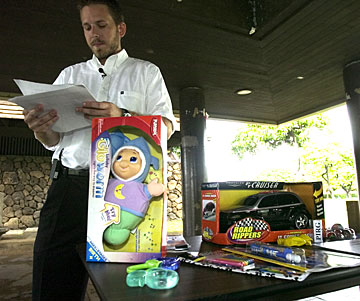
CINDY ELLEN RUSSELL / CRUSSELL@STARBULLETIN.COM
Joshua Walker of the U.S. Public Interest Group held a press conference yesterday at Moiliili District Park about unsafe toys on the market. Some of the dangerous toys featured were the Hasbro Glo Worm and teething rings that tested positive for the toxic chemical phthalate. Also, a PT Cruiser toy produced sound at unacceptable decibel levels.
|
|
Watchdog rates dangerous toys
The hazards include choking, loud noise and chemicals linked to a host of maladies
WITH the holidays approaching, a national watchdog group is urging parents to not rely solely on warning labels to alert them to unsafe toys.
For the past 20 years, U.S. Public Interest Research Group has published its "Trouble in Toyland" report to help parents select toys that are safe for their children and highlight some of the dangerous products on store shelves.
"We did not do an all-inclusive report. What we did was identify hazards so the consumers can make wise choices," said Joshua Walker, U.S. PIRG field organizer. He was at a Honolulu press conference yesterday where the group highlighted its 2005 list of toys it deems unsafe.
Manufacturers of toys small enough -- or with parts small enough -- to be swallowed by children are required by law to include a choking hazard warning. According to federal law, the toy or part is too small if it can fit into a 1.75-inch diameter cylinder, roughly the size of the cardboard core of a toilet paper roll.
U.S. PIRG officials said they purchased toys at local stores that did not have the required choking-hazard warning.
The group also found one large toy manufacturer, Mattel, using warning labels that do not conform with federal law and other manufacturers putting warnings on products that do not contain small parts making the label less useful to parents.
Other toys purchased locally produce sounds at levels high enough to cause hearing damage, according to some health and safety standards.
The newest hazard the group is highlighting is the use of phthalates, a class of chemicals used to soften polyvinyl chloride in toys and teethers. Studies have linked phthalates to birth defects, premature births, early-onset puberty and lower sperm counts. Last year the European Union banned the use of six types of phthalates in toys and childcare products intended for children under three.
U.S. PIRG found six soft plastic toys touted by their manufacturers as being phthalate-free to contain phthalates. It is petitioning the Federal Trade Commission to take action against the manufacturers for deceptive marketing.
Trouble in Toyland is meant to provide parents guidelines and tools to help them test toys and decide which ones are safe for their children, Walker said. "Ultimately it's the parents choice what to buy," he said.
But, he said, if parents are not sure of the safety of a toy, they shouldn't buy it until they are sure.

